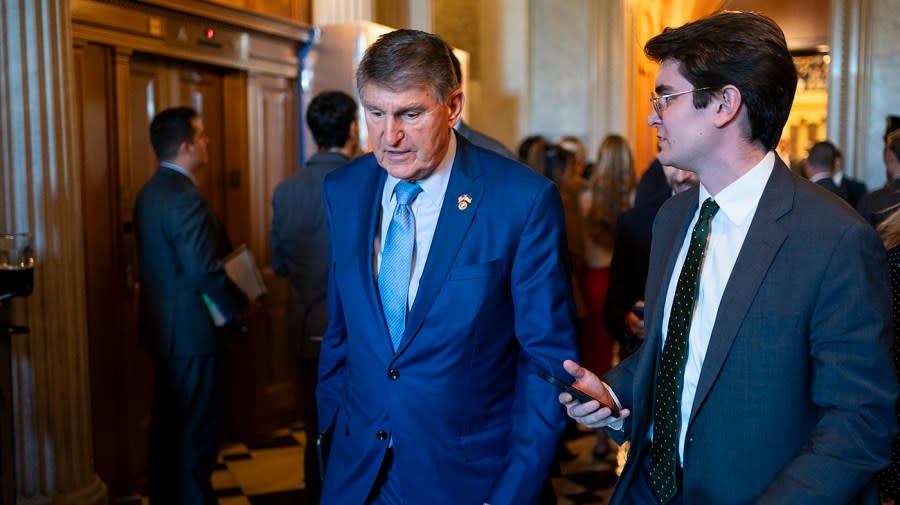The Memo: Manchin adds new uncertainty to Biden’s 2024 chances

Sen. Joe Manchin (D-W.Va.) gave a new jolt to a volatile national political landscape Thursday when he announced that he would not run for reelection to the Senate — and seemed to suggest that he could be on the brink of a presidential run.
Both parties are grappling with the ramifications of his decision, in terms of the White House as well as the Senate.
The senator’s imminent retirement almost certainly hands Republicans a gain in the Senate.
West Virginia voted for former President Trump by nearly 40 points over President Biden in 2020. It hasn’t backed a Democrat for the White House since 1996. And Manchin was only able to hold his seat by maintaining significant distance between the national Democratic Party’s agenda and his own political brand — often to the irritation of his party colleagues.
But the hints Manchin dropped in relation to a presidential run could have even greater importance than the coming Senate battle.
Manchin and the No Labels group have flirted with each other for months, as the organization has sought to secure ballot access in as many states as possible.
No Labels purports to seek “common-sense” moderate positions that can bring Democrats and Republicans together. Its critics contend it’s a sanctimony-wrapped vehicle to advance wealthy interests.
In the case of 2024, many Democrats also accuse No Labels of mounting a shadowy effort to erode Biden’s chances of reelection — a belief that has ruptured the group’s relations with other centrist groups such as Third Way.
Third Way has accused No Labels of “undermining our democracy” as it has shaped up to run a candidate in 2024.
During his remarks announcing his decision, Manchin talked of “working across the aisle and finding common ground.”
In the very same sentence as he stated he would not run for reelection to the Senate, he added, “but what I will be doing is traveling the country and speaking out to see if there is an interest in creating a movement to mobilize the middle and bring Americans together.”
That sounds virtually like a No Labels manifesto, though the group has previously indicated it would not settle on a candidate until its nominating convention, which is set for April in Dallas. No Labels representatives have also noted that they might not select a candidate at all in the end.
In any event, a Manchin candidacy — with No Labels or otherwise — would complicate an already messy political picture when it comes to 20204.
Robert F. Kennedy Jr. is now campaigning as an independent, having initially mounted a Democratic primary challenge to Biden. Academic and activist Cornel West, having sought the Green Party nomination, is now also running as an independent. And, only hours before Manchin’s announcement, Jill Stein — the Green Party’s presidential nominee in 2012 and 2016 — announced she too was entering the race, once again seeking the Green nomination.
The different permutations of what could happen are dizzying.
Some recent polling has suggested that Kennedy could draw more support from former President Trump than from Biden. West, running from the left, will almost surely take more from Biden than from Trump.
The effects of the candidacies of Stein and Manchin, if they happen, are harder to compute.
In the meantime, other Democrats — long enraged by Manchin’s centrism, including his pivotal role in killing the expanded child tax credit earlier in the Biden presidency — are pouring scorn on his stated rationale for his political positioning.
“Let’s be clear: when Joe Manchin talks about ‘the middle’ he means cutting Social Security for anyone not near retirement, young people and future generations,” Rep. Ted Lieu (D-Calif.) wrote on social media Thursday afternoon.
In any event, the ramifications for the Senate are clear with Manchin’s coming retirement. Virtually no one believes the Democrats can find a candidate capable of holding his seat. Right now, Manchin gives the Democrats a de facto 51-49 advantage in the upper chamber.
Even this slim edge, however, depends upon the party retaining the support of Sen. Kyrsten Sinema (Ariz.), a former Democrat who still caucuses with the party though she is now officially an independent.
Sinema is also up for reelection in 2024, where she faces uncertain prospects in a three-way race — assuming she runs, which she has not yet confirmed she will do.
Democrats face a challenging Senate map as it is next year, defending 23 seats. Manchin’s decision makes it even less likely that the party will stay in the majority.
Manchin may be surrendering the Senate seat. But he’s unlikely to surrender the spotlight or his future ambitions.
That could spell trouble for Biden and his party.
The Memo is a reported column by Niall Stanage.
For the latest news, weather, sports, and streaming video, head to The Hill.


